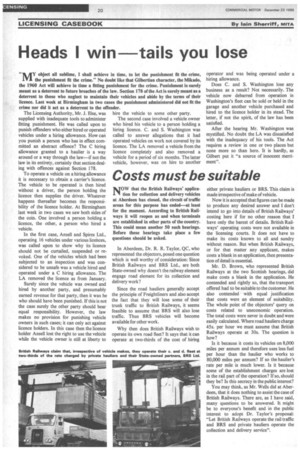Heads I win tails you lose
Page 22

If you've noticed an error in this article please click here to report it so we can fix it.
object all sublime, I shall achieve in time, to let the punishment fit the crime, the punishment fit the crime." No doubt like that Gilbertian character, the Mikado, the 1960 Act will achieve in time a fitting punishment for the crime. Punishment is surely meant as a deterrent to future breaches of the law. Section 178 of the Act is surely meant as a deterrent to those who neglect to maintain their vehicles and abide by the terms of their licence. Last week at Birmingham in two cases the punishment administered did not fit the crime nor did it act as a deterrent to the offender.
The Licensing Authority, Mr. J. Else, was supplied with inadequate tools to administer fitting punishment. He was called upon to punish offenders who either hired or operated vehicles under a hiring allowance. How can you punish a person who has in effect committed an abstract offence? The C hiring allowance granted to a haulier is a way around or a way through the law—if not the law in its entirety, certainly that section dealing with offences against Section 178.
To operate a vehicle on a hiring allowance it is necessary to obtain a carrier's licence. The vehicle to be operated is then hired without a driver, the person holding the licence then supplies the driver. Whatever happens thereafter becomes the responsibility of the licence holder. At Birmingham last week in two cases we saw both sides of the coin. One involved a person holding a licence, the other, a person who hired a vehicle.
In the first case, Ansell and Spires Ltd., operating 16 vehicles under various licences, was called upon to show why its licence should not be curtailed, suspended or revoked. One of the vehicles which had been subjected to an inspection and was considered to be unsafe was a vehicle hired and operated under a C hiring allowance. The LA removed the licence as from January.
Surely since the vehicle was owned and hired by another party, and presumably earned revenue for that party, then it was he who should have been punished. If this is not the case surely the other party should bear equal responsibility. However, the law makes no provision for punishing vehicle owners in such cases; it can only act against licence holders. In this case then the licence holder Ansell lost the right to use the vehicle while the vehicle owner is still at liberty to hire the vehicle to some other party.
The second case involved a vehicle owner who hired his vehicle to a person holding a hiring licence. C. and S. Washington was called to answer allegations that it had operated vehicles on work not covered by its licence. The LA removed a vehicle from the licence completely and also removed a vehicle for a period of six months. The latter vehicle, however, was on hire to another operator and was being operated under a hiring allowance.
Does C. and S. Washington lose any business as a result? Not necessarily. The vehicle now debarred from operation in Washington's fleet can be sold or held in the garage and another vehicle purchased and hired to the licence holder in its stead. The letter, if not the spirit, of the law has been satisfied.
After the hearing Mr. Washington was mystified. No doubt the LA was dissatisfied with the inadequacy of his tools. The Act requires a review in one or two places but none more so than here. It is hardly, as Gilbert put it "a source of innocent merriment".












































































